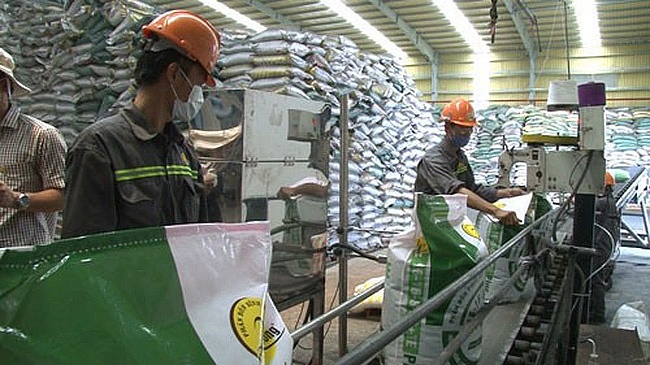Agro-product providers and exporters defy impact of sharp increase in fertiliser prices
 |
| Agro-product providers and exporters defy the impact of a sharp increase in fertiliser prices |
Since early this year, fertiliser prices consecutively broke records with the latest price between VND16-18 million ($700-780) per tonne – the highest level in the past 50 years, according to the Department of Plant Protection under the Ministry of Agriculture and Rural Development (MARD).
The selling price of URE Ninh Binh and Ha Bac climbed to VND17.5 million ($760) per tonne, while diammonium phosphate fertiliser registered the biggest rise to reach VND22 million ($950) per tonne.
An MARD report showed that in 2021, Vietnam imported 5.1 million tonnes of fertilisers, and in the first four months of 2022, the figure was over 880,000 tonnes.
Nguyen Tri Ngoc, vice chairman of the Vietnam Fertiliser Association said, “The fertiliser price hike is attributed to the inadequate supply of these products because of the Russia-Ukraine conflict. Russia and Belarus make up nearly half of the potassium fertilisers on the globe, and Vietnam entirely depends on potassium fertiliser imports.”
The soaring prices of oil and gas, which accounted for a significant part of production costs, also pushed up fertiliser prices,” Ngoc added. “In the upcoming time, businesses will have to accept a new price level for fertilisers.”
Although fertilisers account for up to half of the production costs and the proportion has been forecast to increase further, many providers and processors of agro-products for export reflect that they are not yet affected by the drastic adjustments.
Nguyen Duc Hiep, deputy director of Intimex – the third-largest Vietnamese coffee exporter told VIR, “Our production is not impacted by this price storm because we signed long-term contracts with households and cooperatives. However, the company still has solutions to share risks with farmers and cooperatives, which are the company’s partners.”
Both businesses and households have solutions to proactively adapt to this price adjustment, Hiep explained. “For example, businesses can accept less profit for product batches under signed contracts. However, they can negotiate with partners to adjust the products’ selling prices under new contracts. Meanwhile, farmers are changing the cultivation method and switching to using organic fertiliser,” Hiep said.
Elsewhere, a rice production chain run by Loc Troi Agricultural Products (LTA) is building up a sustainable closed production chain to limit risks. It is responsible for the vital initial and final stages of the closed process, from seed to harvest and transportation to a network of factories located throughout the Mekong Delta region for drying, milling, storage, and delivery following signed contracts.
Meanwhile, cooperatives and households connected to Loc Troi are assured of sufficient varieties, agricultural equipment, and vital services, without having to worry about production capital or risk from agricultural tool price fluctuations.
Before each harvest, LTA agrees to consume all rice produced to provide a consistent income for farmers and to promote Vietnam’s rice competitiveness in the global market.
Representatives of many businesses said that the farmers, who have fragmented cultivation, suffer the most with the price rises. Costs have increased due to the influence of the upward price trend on the global market, and thus to reinforce the development of domestically-made fertiliser products, the MARD has proposed a VAT on imported products.
According to current regulations, imported fertilisers are exempted from VAT. Therefore, producers do not have a declaration, deduction, or refund of VAT for input materials. That has made input costs high, causing selling prices to increase. An application of VAT will contribute to limiting imported fertilisers, paving the way for domestically-made fertiliser producers to increase the market share.
Besides that, the Ministry of Finance also proposed to apply an export tax of 5 per cent on a number of fertiliser types to control the export activity of these products, which helps to diversify the supply source for the domestic market.
The ministry has also proposed reviewing the export tax policy for various types of fertilisers and creating export control measures for them to meet domestic demand. Vietnam’s agricultural sector consumes an average of over 10 million tonnes of fertilisers per year. In 2021, the figure was 10.7 million, over five million tonnes of which were imported.
What the stars mean:
★ Poor ★ ★ Promising ★★★ Good ★★★★ Very good ★★★★★ Exceptional
Related Contents
Latest News
More News
- Vietnamese businesses diversify amid global trade shifts (February 03, 2026 | 17:18)
- Consumer finance sector posts sharp profit growth (February 03, 2026 | 13:05)
- Vietnam and US to launch sixth trade negotiation round (January 30, 2026 | 15:19)
- NAB Innovation Centre underscores Vietnam’s appeal for tech investment (January 30, 2026 | 11:16)
- Vietnam moves towards market-based fuel management with E10 rollout (January 30, 2026 | 11:10)
- Vietnam startup funding enters a period of capital reset (January 30, 2026 | 11:06)
- Vietnam strengthens public debt management with World Bank and IMF (January 30, 2026 | 11:00)
- PM inspects APEC 2027 project progress in An Giang province (January 29, 2026 | 09:00)
- Vietnam among the world’s top 15 trading nations (January 28, 2026 | 17:12)
- Vietnam accelerates preparations for arbitration centre linked to new financial hub (January 28, 2026 | 17:09)

 Tag:
Tag:

























 Mobile Version
Mobile Version